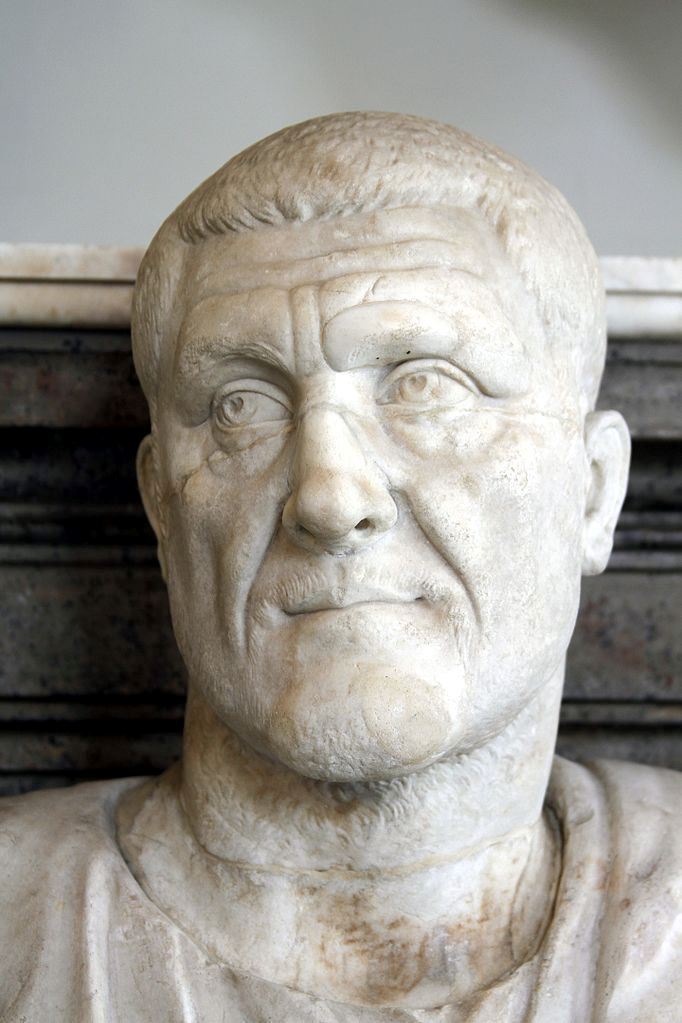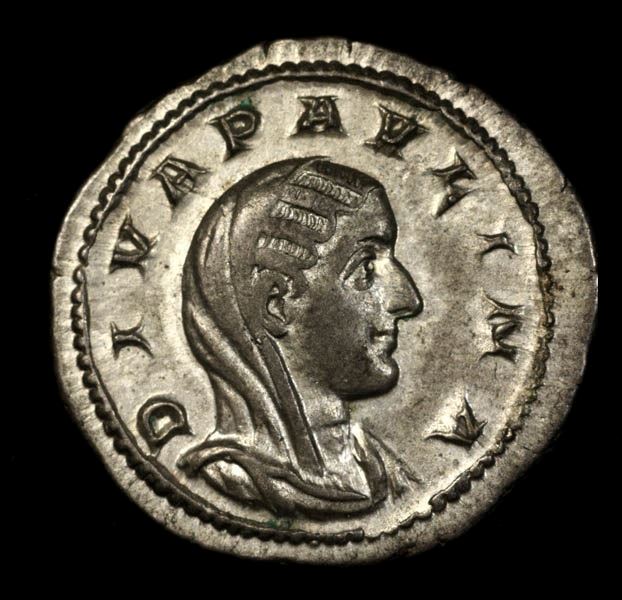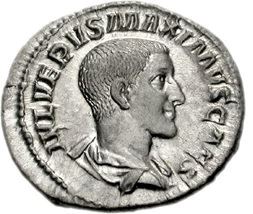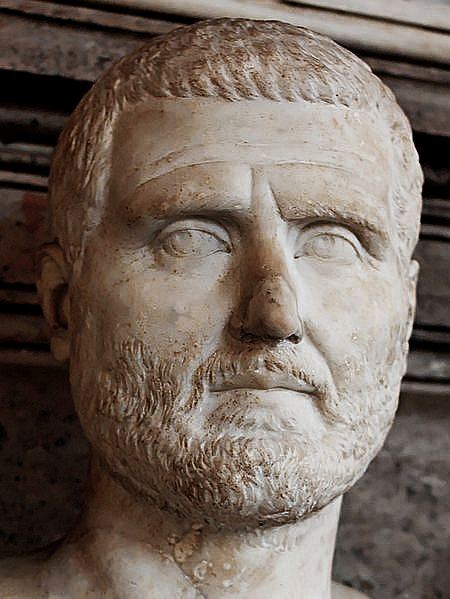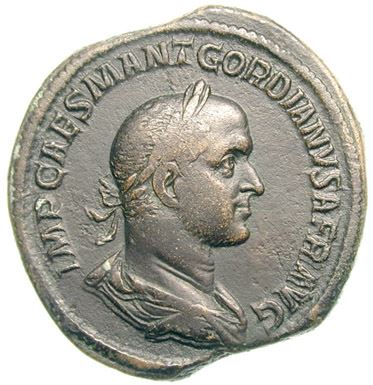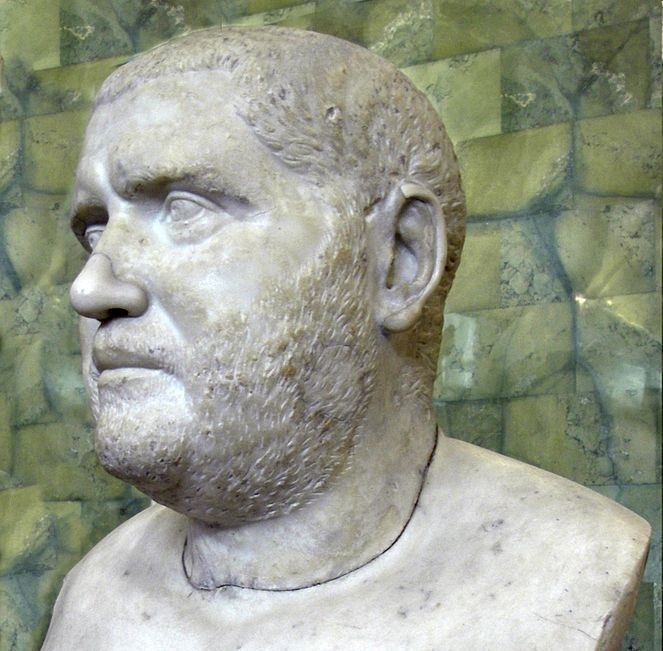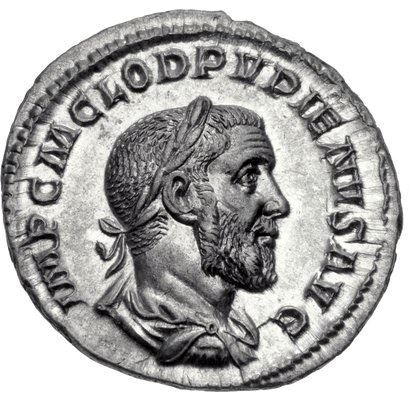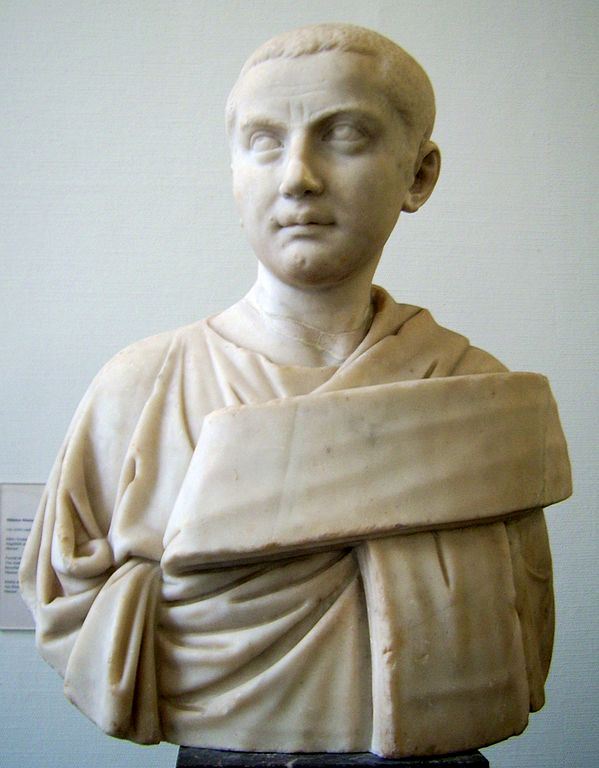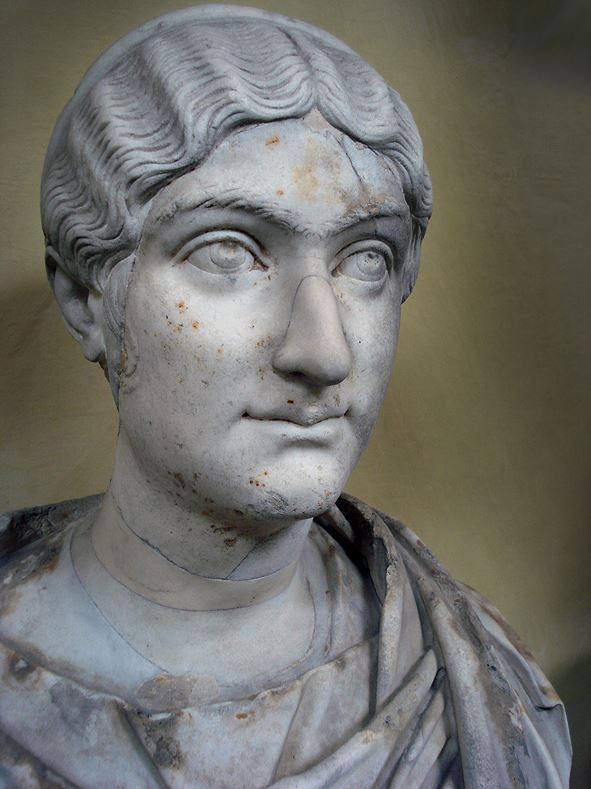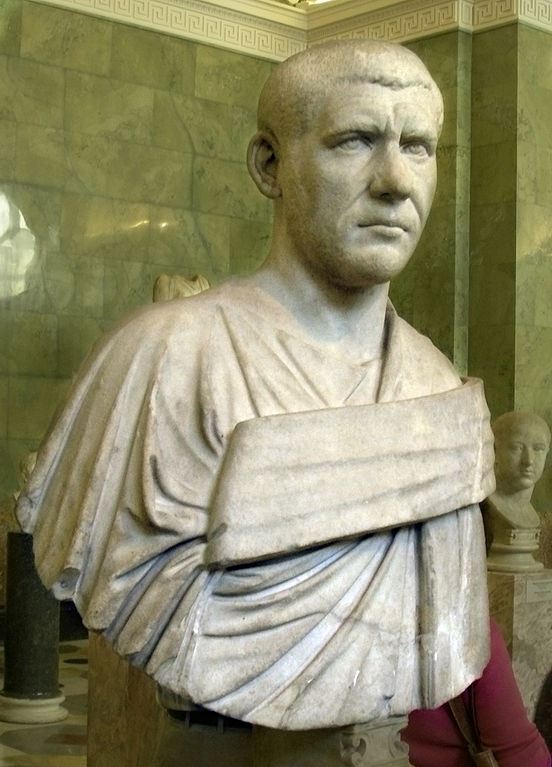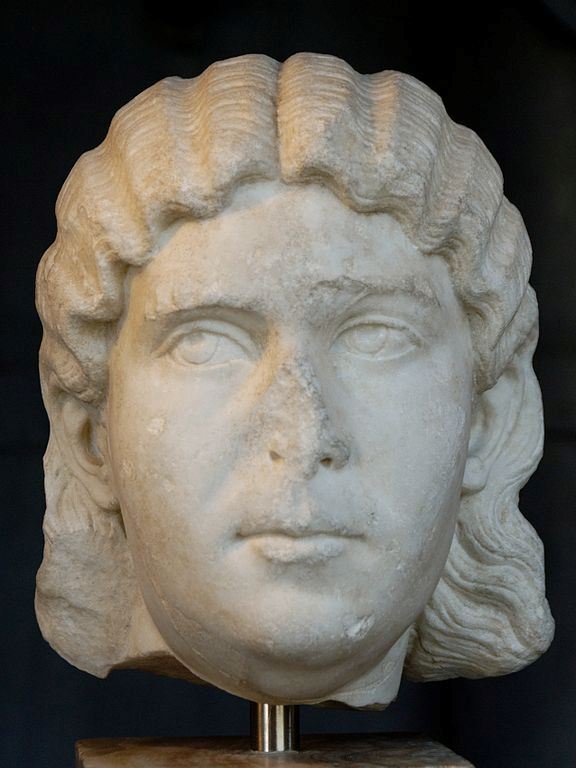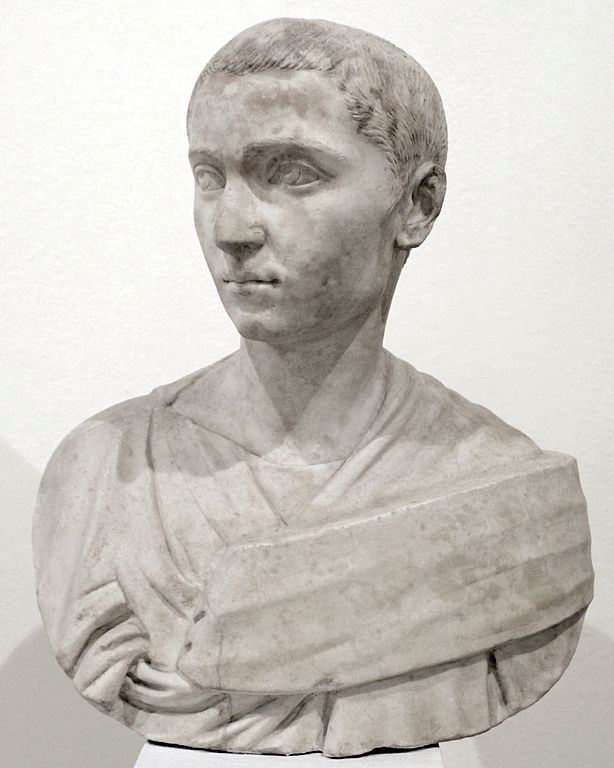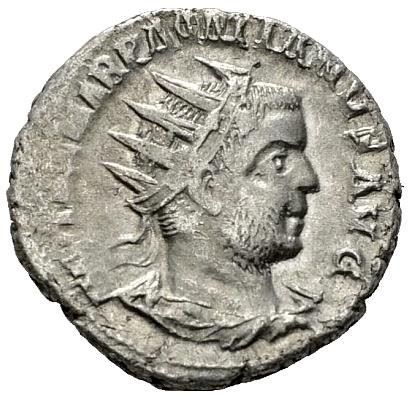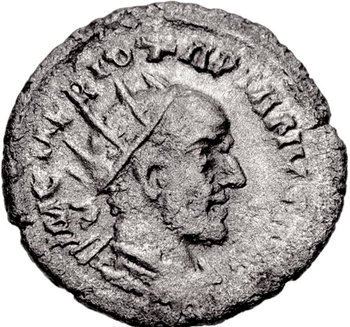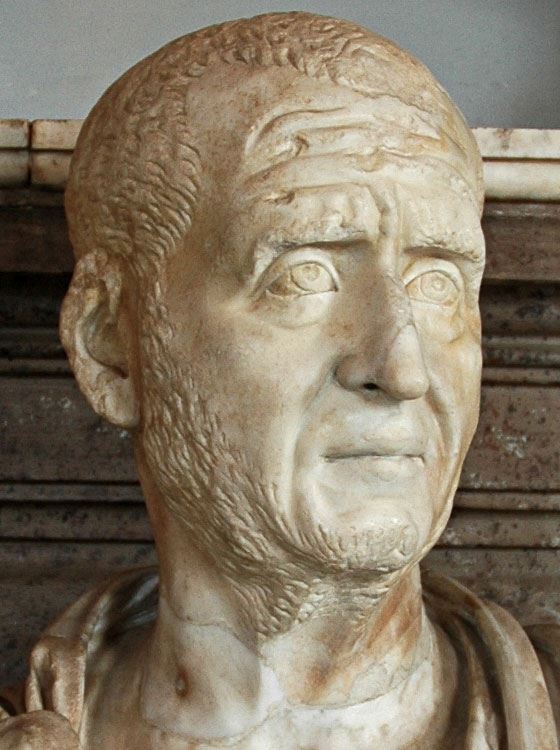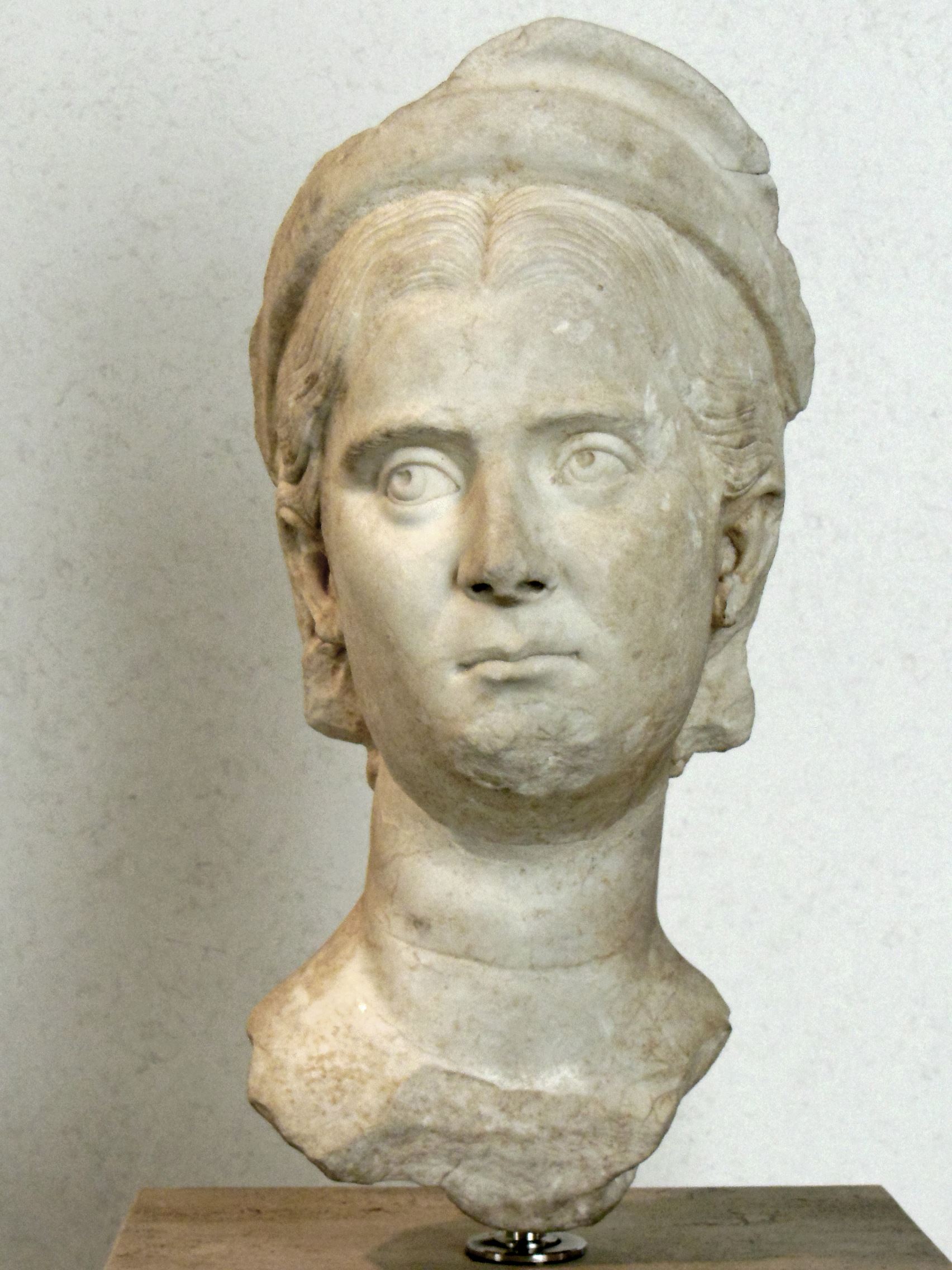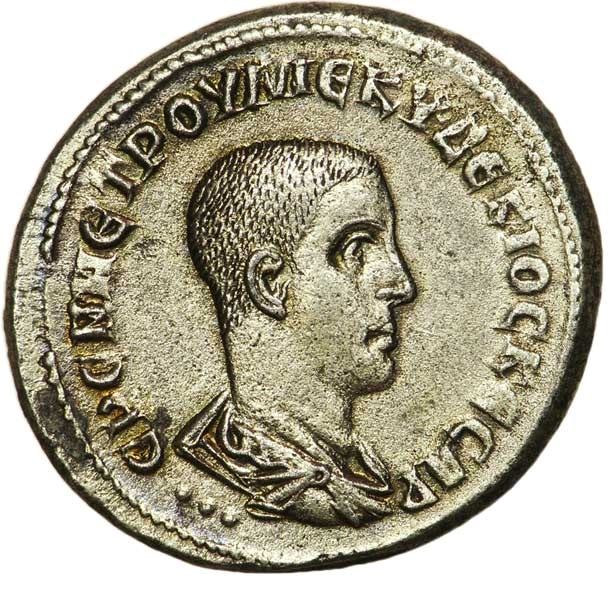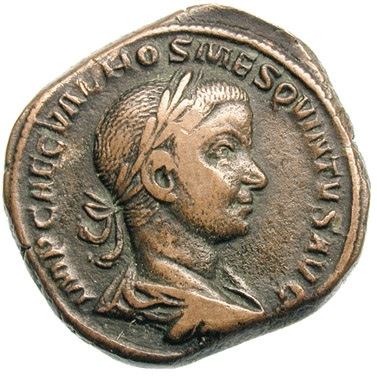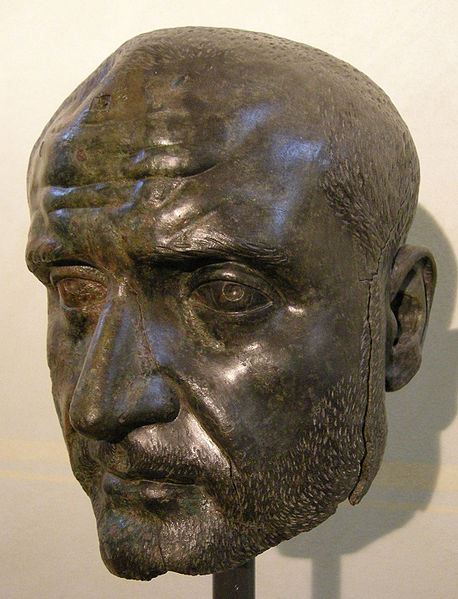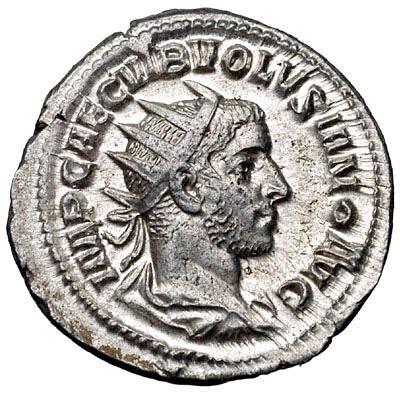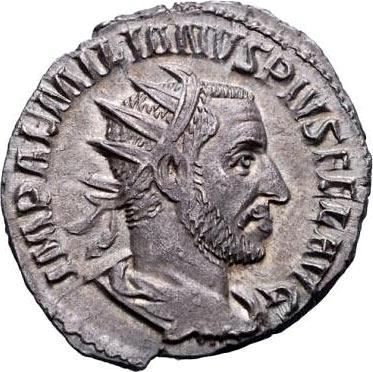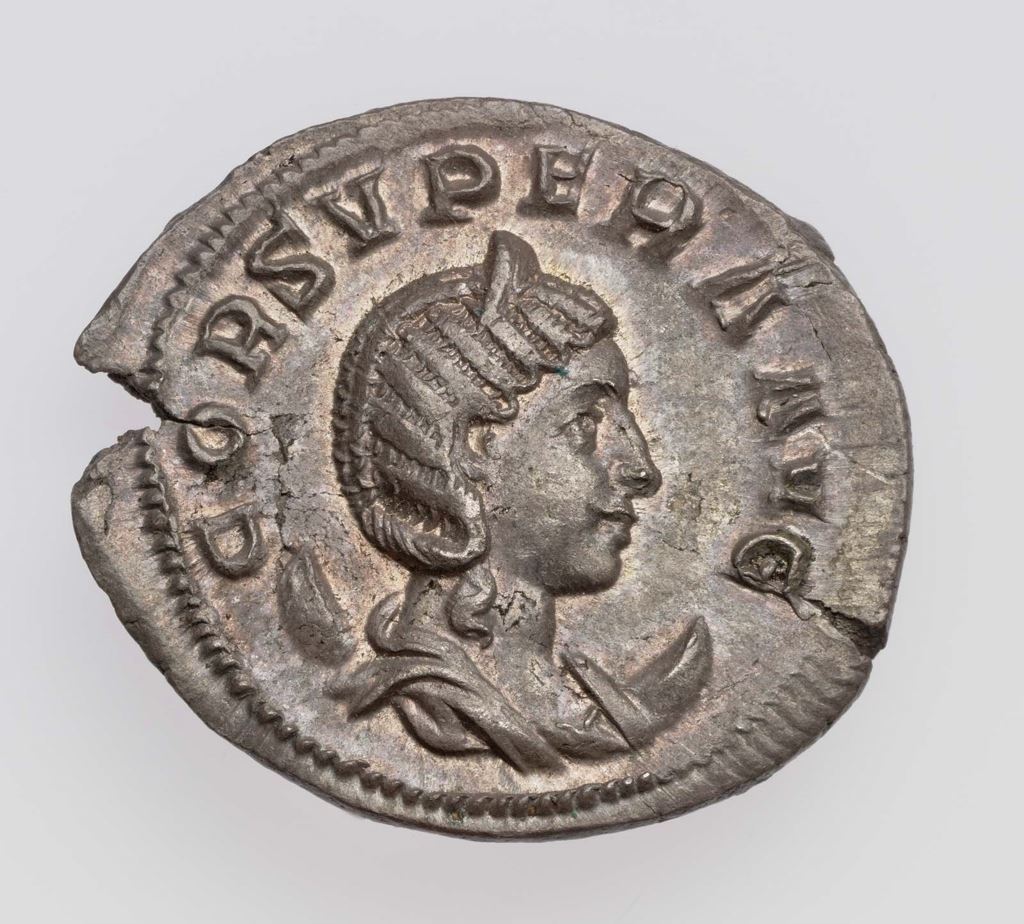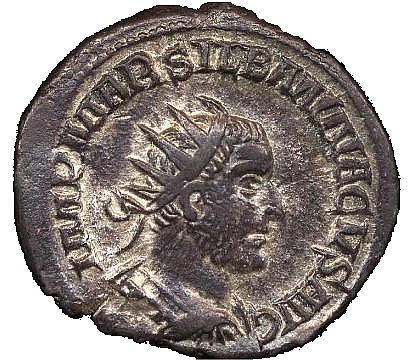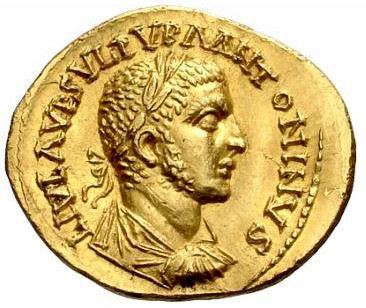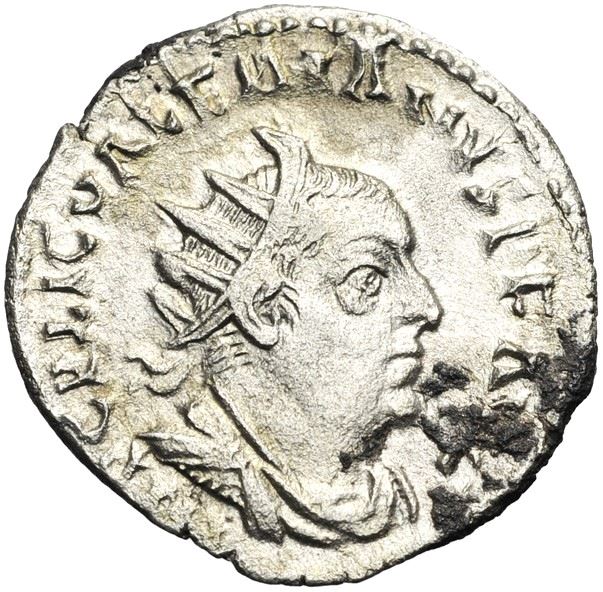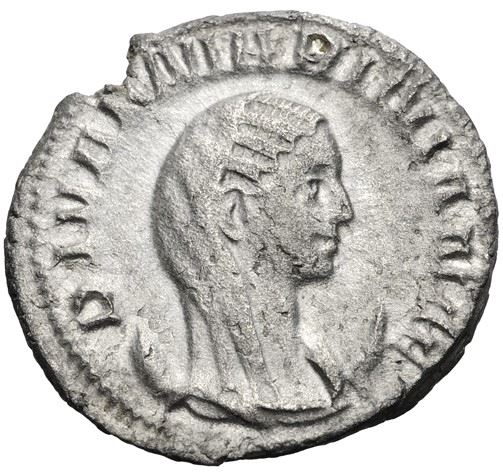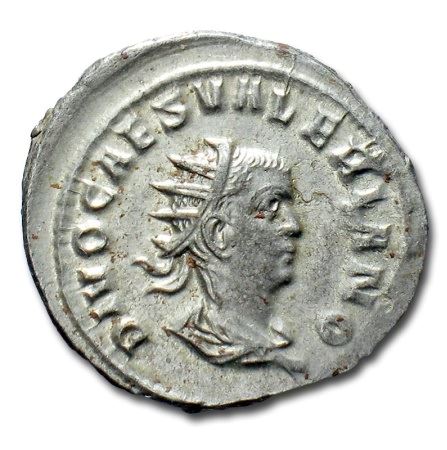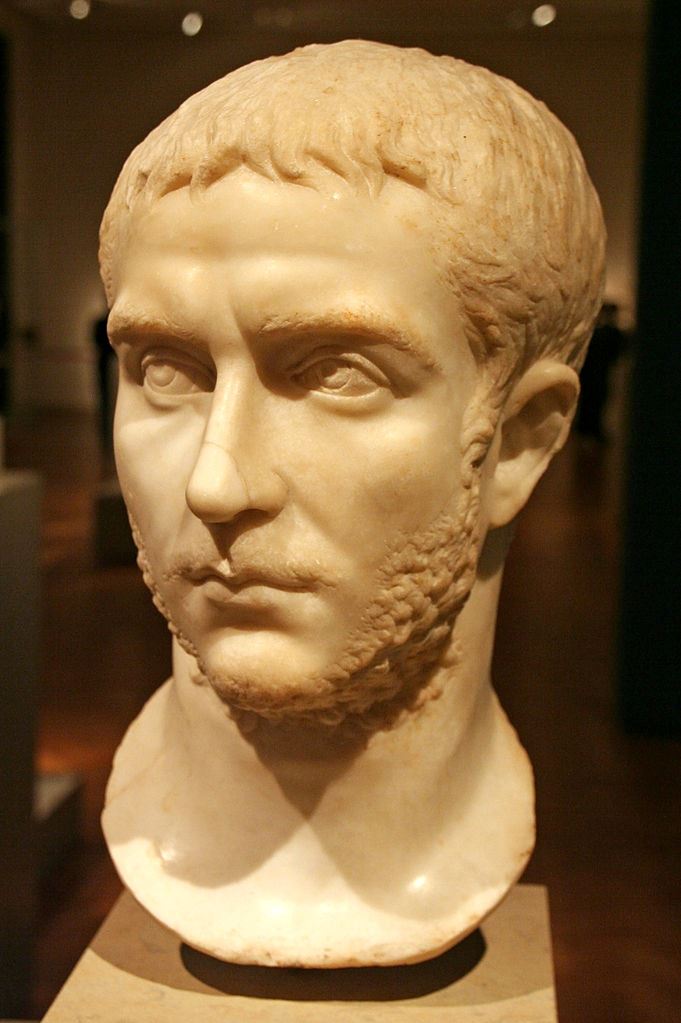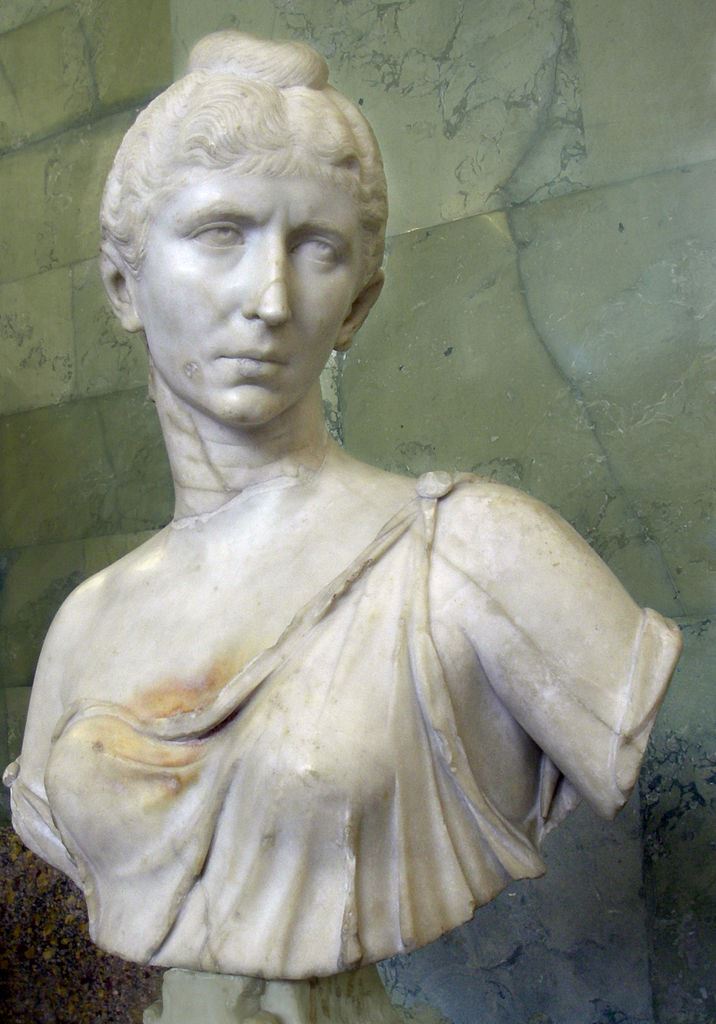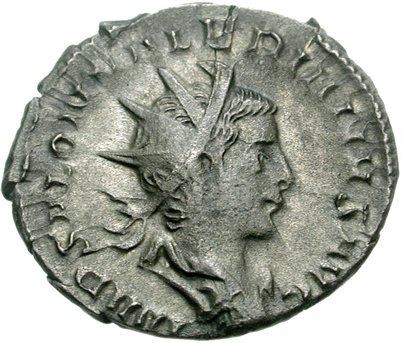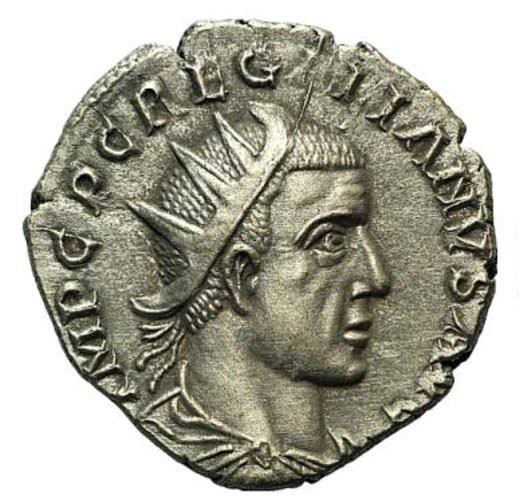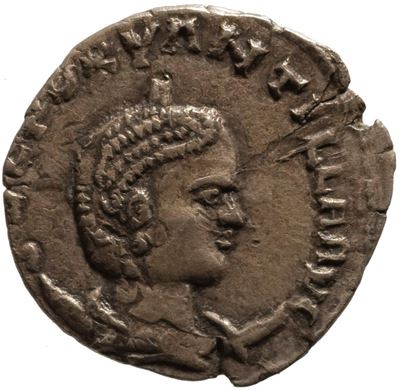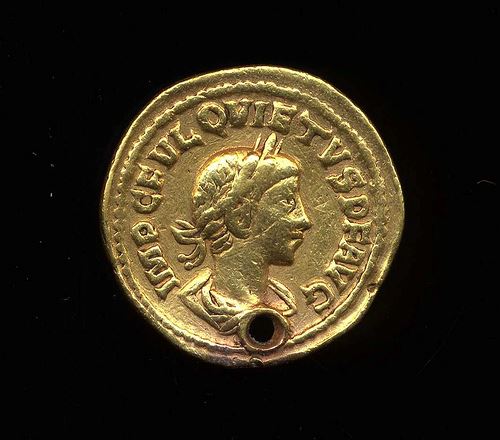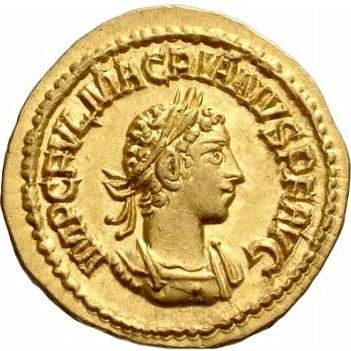The Crisis of the 3rd Century was a period in which the Roman Empire nearly collapsed under the combined pressures of invasion, civil war, plague, and economic depression. It began with the assassination of Emperor Severus Alexander by his own troops in 235.
By 268, the empire had split into three competing states: the Gallic Empire, the Palmyrene Empire, and the Italian-centered and independent Roman Empire. Coins from the competing empires are covered in the Secessionist Empires category.
In 270 AD, emperor Aurelian reunited the empire - coins from his reign and until the Tetrarchy was created by Diocletian in 284 AD are covered by the Recovery Period category.
By 268, the empire had split into three competing states: the Gallic Empire, the Palmyrene Empire, and the Italian-centered and independent Roman Empire. Coins from the competing empires are covered in the Secessionist Empires category.
In 270 AD, emperor Aurelian reunited the empire - coins from his reign and until the Tetrarchy was created by Diocletian in 284 AD are covered by the Recovery Period category.
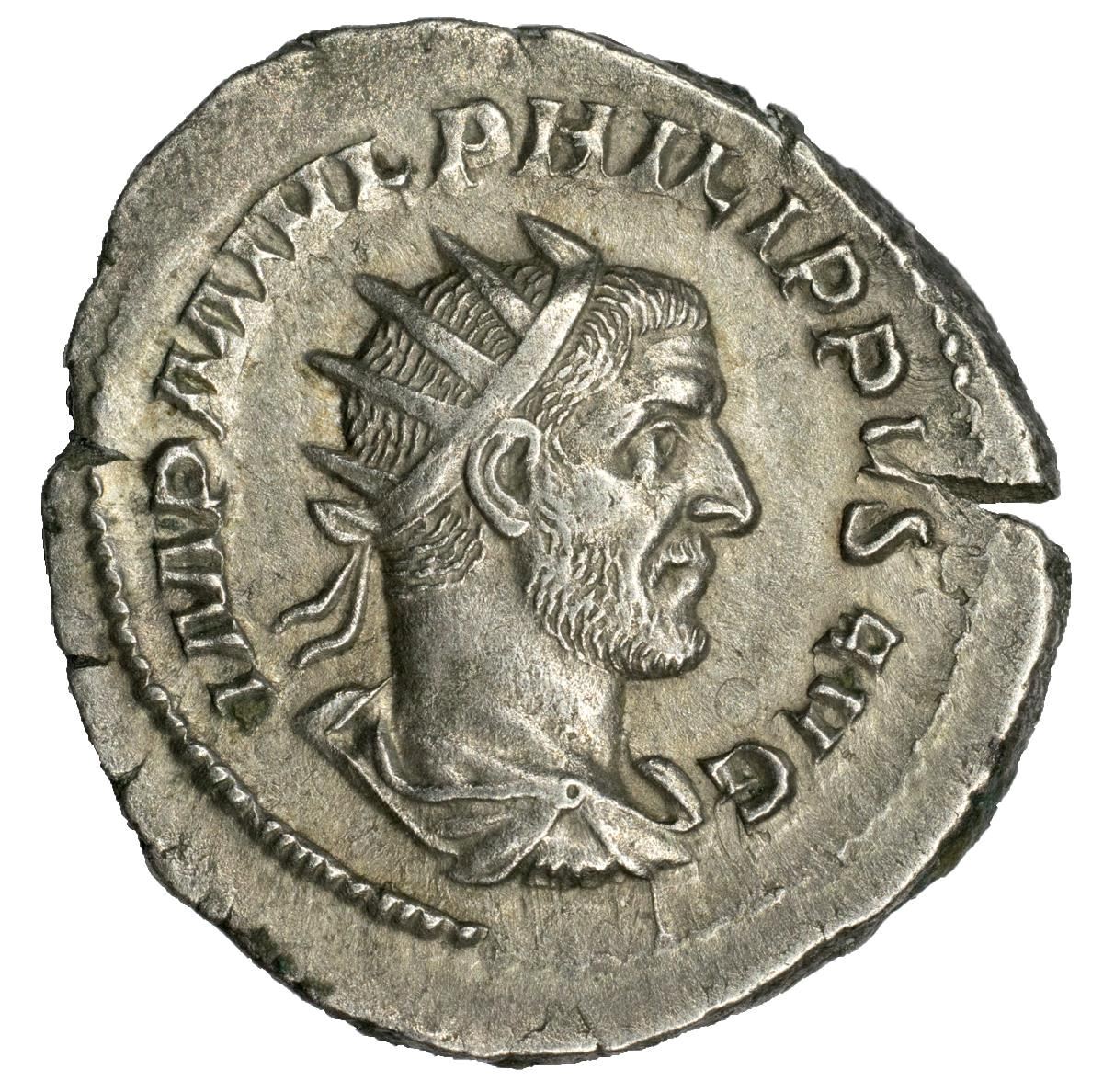
Gaius Julius Verus Maximinus Augustus, also known as Maximinus Thrax, was Roman Emperor from 235 to 238.
He rose to power when his legion - Legio IV 'Italica' - killed Emperor Alexander Severus and his mother in 235 and elected the stern general emperor.
Maximinus was a provincial of low birth, and was seen by the Senate as a barbarian, not even a true Roman, despite Caracall...
He rose to power when his legion - Legio IV 'Italica' - killed Emperor Alexander Severus and his mother in 235 and elected the stern general emperor.
Maximinus was a provincial of low birth, and was seen by the Senate as a barbarian, not even a true Roman, despite Caracall...
Caecilia Paulina was a Roman Empress and consort to Emperor Maximinus Thrax, who ruled in 235–238.
Almost nothing is known about her life, as ancient writers rarely mentioned her by name. Her husband never set foot in Rome, thus it is likely that neither did she, at least in her time married to the Emperor.
Paulina had one son, Gaius Julius Verus Maximus, appointed Caesar in ...
Almost nothing is known about her life, as ancient writers rarely mentioned her by name. Her husband never set foot in Rome, thus it is likely that neither did she, at least in her time married to the Emperor.
Paulina had one son, Gaius Julius Verus Maximus, appointed Caesar in ...
Gaius Julius Verus Maximus was the son of the Roman Emperor Maximinus Thrax and his wife, Caecilia Paulina.
Maximinus appointed his son Maximus caesar around 236, but he held little real power. Both were murdered by the Praetorian Guard in May 238, during the Siege of Aquileia in the Year of the Six Emperors.
In contrast to almost all other 3rd century rulers, Maximus is more...
Maximinus appointed his son Maximus caesar around 236, but he held little real power. Both were murdered by the Praetorian Guard in May 238, during the Siege of Aquileia in the Year of the Six Emperors.
In contrast to almost all other 3rd century rulers, Maximus is more...
Marcus Antonius Gordianus Sempronianus Romanus Africanus was Roman Emperor for one month with his son Gordian II in 238, the Year of the Six Emperors.
During the reign of Alexander Severus, Gordian became governor of the province of Africa Proconsularis. When Maximinus Thrax killed Alexander Severus and assumed the throne, a tax revolt broke out in Africa - and Gordian was forced to ass...
During the reign of Alexander Severus, Gordian became governor of the province of Africa Proconsularis. When Maximinus Thrax killed Alexander Severus and assumed the throne, a tax revolt broke out in Africa - and Gordian was forced to ass...
Marcus Antonius Gordianus Sempronianus Romanus Africanus Augustus was Roman Emperor for one month with his father Gordian I in 238, the Year of the Six Emperors.
During the reign of Alexander Severus, Gordian's father became governor of the province of Africa Proconsularis. When Maximinus Thrax killed Alexander Severus and assumed the throne, a tax revolt broke out in Africa - and the G...
During the reign of Alexander Severus, Gordian's father became governor of the province of Africa Proconsularis. When Maximinus Thrax killed Alexander Severus and assumed the throne, a tax revolt broke out in Africa - and the G...
Decimus Caelius Calvinus Balbinus Pius Augustus was Roman Emperor with Pupienus for three months in 238, the Year of the Six Emperors.
Not much is known about Balbinus before his elevation to emperor. When the Gordians were proclaimed Emperors in Africa, the Senate appointed a committee of twenty men, including Balbinus, to co-ordinate operations against Maximinus Thrax. On the news of ...
Not much is known about Balbinus before his elevation to emperor. When the Gordians were proclaimed Emperors in Africa, the Senate appointed a committee of twenty men, including Balbinus, to co-ordinate operations against Maximinus Thrax. On the news of ...
Marcus Clodius Pupienus Maximus Augustus was Roman Emperor with Balbinus for three months in 238, during the Year of the Six Emperors.
When the Gordians were proclaimed Emperors in Africa, the Senate appointed a committee of twenty men to co-ordinate operations against Maximinus until the arrival of the Gordians. On the news of the Gordians' defeat and deaths, the Senate voted for two m...
When the Gordians were proclaimed Emperors in Africa, the Senate appointed a committee of twenty men to co-ordinate operations against Maximinus until the arrival of the Gordians. On the news of the Gordians' defeat and deaths, the Senate voted for two m...
Marcus Antonius Gordianus Pius Augustus was Roman Emperor from 238 AD to 244 AD.
At the age of 13, he became the youngest sole legal Roman emperor throughout the existence of the united Roman Empire. Due to Gordian's age the imperial government was surrendered to the Senate.
In 241, Gordian was married to Furia Sabinia Tranquillina, daughter of the newly appointed praetorian...
At the age of 13, he became the youngest sole legal Roman emperor throughout the existence of the united Roman Empire. Due to Gordian's age the imperial government was surrendered to the Senate.
In 241, Gordian was married to Furia Sabinia Tranquillina, daughter of the newly appointed praetorian...
Furia Sabinia Tranquillina was the Empress of Rome and wife of Emperor Gordian III.
In 241 her father was appointed the head of the Praetorian Guard by the Roman Emperor Gordian III. In May that year, Tranquillina had married Gordian.
She became a Roman Empress and received the honorific title of Augusta. Her marriage to Gordian was an admission by the young emperor of both...
In 241 her father was appointed the head of the Praetorian Guard by the Roman Emperor Gordian III. In May that year, Tranquillina had married Gordian.
She became a Roman Empress and received the honorific title of Augusta. Her marriage to Gordian was an admission by the young emperor of both...
Marcus Iulius Philippus Augustus, also known commonly by his nickname Philip the Arab, was Roman Emperor from 244 to 249.
He was born in Arabia Petraea, in a city situated in modern-day Syria, and went on to become a major figure in the Roman Empire.
He achieved power after the death of Gordian III, and quickly negotiated a peace with the Sassanid Empire. During his reign, Ro...
He was born in Arabia Petraea, in a city situated in modern-day Syria, and went on to become a major figure in the Roman Empire.
He achieved power after the death of Gordian III, and quickly negotiated a peace with the Sassanid Empire. During his reign, Ro...
Marcia Otacilia Severa was the Empress of Rome and wife of Emperor Marcus Julius Philippus or Philip I Arabs, who reigned over the Roman Empire from 244 to 249.
Severa and Philip are generally considered as the first Christian imperial couple, because during their reign the persecutions of Christians had ceased and the couple had become tolerant towards Christianity but their beliefs ha...
Severa and Philip are generally considered as the first Christian imperial couple, because during their reign the persecutions of Christians had ceased and the couple had become tolerant towards Christianity but their beliefs ha...
Marcus Julius Philippus Severus, also known as Philippus II, Philip II and Philip the Younger, was the son and heir of the Roman Emperor Philip the Arab by his wife Roman Empress Marcia Otacilia Severa.
When his father became emperor in 244, the younger Philip was appointed Caesar. In 247 he became consul, and was later elevated by his father to the rank of Augustus and co-ruler.
...
When his father became emperor in 244, the younger Philip was appointed Caesar. In 247 he became consul, and was later elevated by his father to the rank of Augustus and co-ruler.
...
Tiberius Claudius Marinus Pacatianus was a usurper in the Danube area of the Roman Empire during the time of Philip I Arabs.
He is known from coins, and from mentions in Zosimus and Zonaras, who say that he was an officer in one of the Danube legions. According to Zosimus, the revolts of Pacatianus in Moesia and Iotapianus in Syria prompted Philip to offer to the Roman Senate to step do...
He is known from coins, and from mentions in Zosimus and Zonaras, who say that he was an officer in one of the Danube legions. According to Zosimus, the revolts of Pacatianus in Moesia and Iotapianus in Syria prompted Philip to offer to the Roman Senate to step do...
Marcus F. Ru. Jotapianus was a usurper in the eastern provinces of the Roman Empire during the reign of Emperor Philip the Arab, around 249. He is known from his rare coins and from accounts in Aurelius Victor, Zosimus, and Polemius Silvius.
He led a rebellion started in Syria, towards the end of Philip's rule, against the increase in taxation ordered by the rector Orientis Priscus, Phi...
He led a rebellion started in Syria, towards the end of Philip's rule, against the increase in taxation ordered by the rector Orientis Priscus, Phi...
Caesar Gaius Messius Quintus Traianus Decius Augustus was Roman Emperor from 249 to 251.
Around 245, Emperor Philip I entrusted Decius with an important command on the Danube. By the end of 248 or 249, Decius was sent to quell the revolt of Pacatianus and his troops in Moesia and Pannonia - and after the collapse of the revolt, Decius reluctantly let the troops proclaim him Emperor. ...
Around 245, Emperor Philip I entrusted Decius with an important command on the Danube. By the end of 248 or 249, Decius was sent to quell the revolt of Pacatianus and his troops in Moesia and Pannonia - and after the collapse of the revolt, Decius reluctantly let the troops proclaim him Emperor. ...
Annia Cupressenia Herennia Etruscilla was an Augusta and later regent of the Roman Empire, married to Emperor Decius, and mother of Emperors Herennius Etruscus and Hostilian.
As with most third-century Roman Empresses, very little is known about her. She was probably of senatorial family. It is assumed that her ancestors settled in Etrurian lands.
Herennia married Decius prob...
As with most third-century Roman Empresses, very little is known about her. She was probably of senatorial family. It is assumed that her ancestors settled in Etrurian lands.
Herennia married Decius prob...
Quintus Herennius Etruscus Messius Decius Augustus was Roman emperor in 251, in a joint rule with his father Decius. Emperor Hostilian was his younger brother.
Herennius was made emperor in early 251, and accompanied his father on an expedition against king Cniva of the Goths, to punish him for several raids. Hostilian remained in Rome and the empress Herennia Etruscilla was named regen...
Herennius was made emperor in early 251, and accompanied his father on an expedition against king Cniva of the Goths, to punish him for several raids. Hostilian remained in Rome and the empress Herennia Etruscilla was named regen...
Gaius Valens Hostilianus Messius Quintus Augustus was Roman emperor in 251.
He was born in Sirmium sometime after 230, as the son of the future emperor Decius by his wife Herennia Etruscilla. He was the younger brother of emperor Herennius Etruscus.
Following his father's accession to the throne, Hostilian received the treatment of an imperial prince, but was always kept in t...
He was born in Sirmium sometime after 230, as the son of the future emperor Decius by his wife Herennia Etruscilla. He was the younger brother of emperor Herennius Etruscus.
Following his father's accession to the throne, Hostilian received the treatment of an imperial prince, but was always kept in t...
Gaius Vibius Afinius Trebonianus Gallus Augustus was Roman Emperor from 251 to 253, in a joint rule with his son Volusianus.
His early career was a typical cursus honorum. In 250 he was nominated governor of Moesia Superior, an appointment that showed the confidence of Emperor Trajan Decius in him.
In June 251, Decius and his co-emperor and son Herennius Etruscus died in the ...
His early career was a typical cursus honorum. In 250 he was nominated governor of Moesia Superior, an appointment that showed the confidence of Emperor Trajan Decius in him.
In June 251, Decius and his co-emperor and son Herennius Etruscus died in the ...
Gaius Vibius Volusianus Augustus was a Roman Emperor from 251 to 253. He was son to emperor Trebonianus Gallus by his wife Afinia Gemina Baebiana.
The death of Decius in early June 251 led to Trebonianus Gallus' elevation to the throne. Gallus adopted Decius' son Hostilian and made him co-ruler. Volusianus was named Caesar and Princeps Juventutis. Later in 251 Hostilian died of the plag...
The death of Decius in early June 251 led to Trebonianus Gallus' elevation to the throne. Gallus adopted Decius' son Hostilian and made him co-ruler. Volusianus was named Caesar and Princeps Juventutis. Later in 251 Hostilian died of the plag...
Aemilianus, also known as Aemilian, was Roman Emperor for three months in 253.
Commander of the Moesian troops, he obtained an important victory against the invading Goths and was, for this reason, acclaimed Emperor by his army. He then moved quickly to Italy, where he defeated Emperor Trebonianus Gallus, only to be killed by his own men when another general, Valerian, proclaimed himsel...
Commander of the Moesian troops, he obtained an important victory against the invading Goths and was, for this reason, acclaimed Emperor by his army. He then moved quickly to Italy, where he defeated Emperor Trebonianus Gallus, only to be killed by his own men when another general, Valerian, proclaimed himsel...
Gaia Cornelia Supera was probably the Empress of Rome and wife of Emperor Aemilianus.
Nothing is known about her life, except through numismatic evidences. Her full name on the coins is C[AIA] CORNEL[IA] SVPERA AVG[VSTA], or alternatively CORNEL[IA] SVPERA AVG[VSTA] or COR[NELIA] SVPERA AV[GVSTA]. Her coins are extremely rare.
Her name and monuments were condemned after Valer...
Nothing is known about her life, except through numismatic evidences. Her full name on the coins is C[AIA] CORNEL[IA] SVPERA AVG[VSTA], or alternatively CORNEL[IA] SVPERA AVG[VSTA] or COR[NELIA] SVPERA AV[GVSTA]. Her coins are extremely rare.
Her name and monuments were condemned after Valer...
Silbannacus is a mysterious figure believed to have been a usurper in the Roman Empire during the time of Philip I (244-249), or between the fall of Aemilianus and the rise to power of Valerian (253).
Silbannacus is known only from a two coins, an antoninianus reputedly found in Lorraine and a second coin, which - according to the style - was struck in Rome, and since the shortened lege...
Silbannacus is known only from a two coins, an antoninianus reputedly found in Lorraine and a second coin, which - according to the style - was struck in Rome, and since the shortened lege...
Lucius Julius Aurelius Sulpicius Severus Uranius Antoninus was a usurper who reigned in Syria around 253-254 AD.
We know almost nothing about Uranius Antoninus, except that he was originally a priest called Sampsiceramus, and that he struck silver and gold coinage in the Imperial style and bronze coinage in the local style, with greek legends.
All his coins are very rare. <...
We know almost nothing about Uranius Antoninus, except that he was originally a priest called Sampsiceramus, and that he struck silver and gold coinage in the Imperial style and bronze coinage in the local style, with greek legends.
All his coins are very rare. <...
Publius Licinius Valerianus Augustus, also known as Valerian the Elder, was Roman Emperor from 253 to 260 AD.
Early in his reign, affairs in Europe went from bad to worse, and the whole West fell into disorder. In the East, Antioch had fallen into the hands of a Sassanid vassal and Armenia was occupied by Shapur I. Valerian headed East to face the Persian threat.
He was taken...
Early in his reign, affairs in Europe went from bad to worse, and the whole West fell into disorder. In the East, Antioch had fallen into the hands of a Sassanid vassal and Armenia was occupied by Shapur I. Valerian headed East to face the Persian threat.
He was taken...
Egnatia Mariniana was probably the wife of Roman Emperor Valerian and mother of Emperor Gallienus.
Several coins bearing the legend DIVAE MARINIANAE date back to the beginning of the reign of Valerian and Gallienus.
Given the practice of deifying the wives who died before their husbands' assumption of the Principate, it is possible that Mariniana died before Valerian took po...
Several coins bearing the legend DIVAE MARINIANAE date back to the beginning of the reign of Valerian and Gallienus.
Given the practice of deifying the wives who died before their husbands' assumption of the Principate, it is possible that Mariniana died before Valerian took po...
Publius Licinius Cornelius Valerianus was the eldest son of Roman Emperor Gallienus and Empress Cornelia Salonina.
Shortly after his acclamation as Emperor, Valerian I made Gallienus his co-Emperor and his grandson, Valerian II, Caesar. He was placed in the care of one Ingenuus, who seems to have held an extraordinary command as governor of the Illyrian provinces.
In 257, V...
Shortly after his acclamation as Emperor, Valerian I made Gallienus his co-Emperor and his grandson, Valerian II, Caesar. He was placed in the care of one Ingenuus, who seems to have held an extraordinary command as governor of the Illyrian provinces.
In 257, V...
Publius Licinius Egnatius Gallienus Augustus was Roman Emperor with his father Valerian from 253 to 260 and alone from 260 to 268.
He ruled during the Crisis of the Third Century that nearly caused the collapse of the empire. While he won a number of military victories, he was unable to prevent the secession of the important provinces of Palmyra and Gaul
He was murdered by c...
He ruled during the Crisis of the Third Century that nearly caused the collapse of the empire. While he won a number of military victories, he was unable to prevent the secession of the important provinces of Palmyra and Gaul
He was murdered by c...
Julia Cornelia Salonina was an Augusta of the Roman Empire, married to Roman Emperor Gallienus and mother of Valerian II, Saloninus, and Marinianus.
Her name is reported on coins with Latin legend as Cornelia Salonina; however, from the Greek coinage come the names Iulia Cornelia Salonina, Publia Licinia Cornelia Salonina, and Salonina Chrysogona ("begotten of gold").
Her fat...
Her name is reported on coins with Latin legend as Cornelia Salonina; however, from the Greek coinage come the names Iulia Cornelia Salonina, Publia Licinia Cornelia Salonina, and Salonina Chrysogona ("begotten of gold").
Her fat...
Publius Licinius Cornelius Saloninus Valerianus was Roman Emperor in 260.
Following his brother Valerian II's death in 258, Saloninus was appointed Caesar by his father and sent to Gaul to make sure his father's authority was respected there.
Unfortunately, this endeavour failed spectacularly and the general Postumus was declared emperor by his troops as the first so-called ...
Following his brother Valerian II's death in 258, Saloninus was appointed Caesar by his father and sent to Gaul to make sure his father's authority was respected there.
Unfortunately, this endeavour failed spectacularly and the general Postumus was declared emperor by his troops as the first so-called ...
P. C. Regalianus was a Dacian general who turned against the Roman Empire and became himself emperor for a brief period, being murdered by the hands who raised him to power.
The main source of information is the unreliable and for the most part fabricated Historia Augusta, and other sources call him Trebellianus, Aurelius Victor, or Regillianus.
After the defeat and capture ...
The main source of information is the unreliable and for the most part fabricated Historia Augusta, and other sources call him Trebellianus, Aurelius Victor, or Regillianus.
After the defeat and capture ...
Sulpicia Dryantilla was the wife of Regalianus, Roman usurper against Gallienus.
Regalianus gave her the title of Augusta to legitimize his claim. Virtually nothing is known of her except that she was the daughter of Claudia Ammiana Dryantilla and Sulpicius Pollio, an accomplished senator and officer under Caracalla.
She most likely died in 260 along with her husband, when h...
Regalianus gave her the title of Augusta to legitimize his claim. Virtually nothing is known of her except that she was the daughter of Claudia Ammiana Dryantilla and Sulpicius Pollio, an accomplished senator and officer under Caracalla.
She most likely died in 260 along with her husband, when h...
Titus Fulvius Junius Quietus was a Roman usurper. He was the son of Fulvius Macrianus, also known as Macrianus Major, and the brother of fellow usurper Macrianus Minor.
Quietus, his father and his brother were in Mesopotamia in 260, when the Roman army was defeated, and Valerian was captured. With help from his father, Quietus gained the imperial office together with his brother Macria...
Quietus, his father and his brother were in Mesopotamia in 260, when the Roman army was defeated, and Valerian was captured. With help from his father, Quietus gained the imperial office together with his brother Macria...
Titus Fulvius Iunius Macrianus was a Roman usurper. He was the son of Fulvius Macrianus, also known as Macrianus Major, and the brother of fellow usurper Quietus.
Macrianus, his father and his brother were in Mesopotamia in 260, when the Roman army was defeated, and Valerian was captured. With help from his father, Macrianus gained the imperial office together with his brother Quietus. ...
Macrianus, his father and his brother were in Mesopotamia in 260, when the Roman army was defeated, and Valerian was captured. With help from his father, Macrianus gained the imperial office together with his brother Quietus. ...

